Headlong motion through walls of emerald green, milky jade, the sensation of speed beyond anything he'd known before in cyberspace....The Tessier-Ashpool ice shattered, peeling away from the Chinese program's thrust, a worrying impression of solid fluidity, as though the shards of a broken mirror bent and elongated as they fell--
"Christ," Case said, awestruck, as Kuang twisted and banked above the horizonless fields of the Tessier-Ashpool cores, an endless neon cityscape, complexity that cut the eye, jewel bright, sharp as razors.
"Hey, shit," the construct said, "those things are the old RCA Building. You know the old RCA Building?" The Kuang program dived past the gleaming spires of a dozen identical towers of data, each one a blue neon replica of the Manhattan skyscraper.
"You ever see resolution this high?" Case asked.
"No, but I never cracked an AI neither."
--William Gibson, Neuromancer
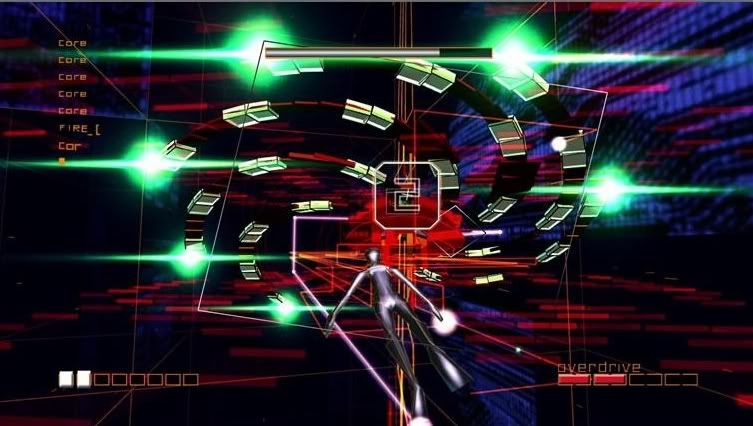
Now you can crack an AI in Rez HD, available for the Xbox Live Arcade!
I guess busting out a quote from Neuromancer is pretty cliche, but the fact is that Rez comes closer than any other game to living up to the beauty of "jacking into cyberspace" as that experience played out in my imagination when I read William Gibson's landmark novel at 15, and again at 20, and again at 25. (There aren't any New York skyscrapers in the game's version of cyberspace, but there are statues of Buddha and other expressions of mankind's spiritual history amidst all the cold hard data.)
It's also the game that looks most like what I imagined games in the future would look like when I was very young, though those concepts were probably heavily influenced by Tron. I'd say that Rez out-Trons Tron, or at least creates a vaguely similar but far more beautiful world.
I'm glad Rez is now easily available at an affordable price. As has been said of it time and time again, it may not be much of a game, but it sure is an experience. So fork over your 800 points, turn out the lights and turn up the music.
------------
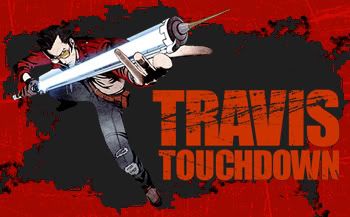 While Rez is basic and elegant and beautiful, the other game I've been playing a lot lately, No More Heroes, is goofy and violent and ugly, but it, too, has reminded me of a sci-fi book people sometimes lump into the "cyberpunk" category. Don't let that categorization fool you, though. This is a true work of literature, a staggering achievement that Time Magazine, and, more importantly, me, consider one of the 100 greatest novels written in the English language since 1923. I'm referring to Neal Stephenson's astounding Snow Crash.
While Rez is basic and elegant and beautiful, the other game I've been playing a lot lately, No More Heroes, is goofy and violent and ugly, but it, too, has reminded me of a sci-fi book people sometimes lump into the "cyberpunk" category. Don't let that categorization fool you, though. This is a true work of literature, a staggering achievement that Time Magazine, and, more importantly, me, consider one of the 100 greatest novels written in the English language since 1923. I'm referring to Neal Stephenson's astounding Snow Crash. I'm not saying that No More Heroes is on par with Snow Crash as an artistic achievement or anything. I'm just saying that the one reminded me of the other, for a number of reasons. For starters, they each have main characters with larger-than-life names. Snow Crash's hero has the unforgettable moniker of Hiro Protagonist, while NMH, the latest game from noteworthy designer Goichi Suda (AKA Suda 51), stars Travis Touchdown. They each live in very modest situations. Travis rents a tiny place at a crappy motel called No More Heroes, while Hiro lives with his roommate Vitaly Chernobyl in a space at a U-Stor-It storage facility. They both live in Southern California, in versions of the United States that are a bit politically fucked-up. Hiro resides in Los Angeles, while Travis makes his home in the absurdly named dead-end town of Santa Destroy. Actually, I'm pretty sure No More Heroes never explicitly states that Santa Destroy is in California, and in fact Santa Destroy has its own flag, a massive red, white and blue flag with a single star in the middle. The game doesn't explain what that's about, which I kinda like. Maybe it's its own city-state.
 In both Hiro's and Travis' America, the dollar is not what it used to be. Inflation has hit the United States of Snow Crash so hard that, to quote from the Wikipedia entry, "trillion dollar bills — Ed Meeses — are nearly disregarded and the quadrillion dollar note — the Gipper — is the standard 'small' bill." In NMH, the common form of currency is called an "LB." The game never explains this, either, so I'm not sure if I should be imagining cash with Lyndon B. Johnson's face on it, or images of the Liberty Bell, or if I should assume that Lance Bass has conquered the nation.
In both Hiro's and Travis' America, the dollar is not what it used to be. Inflation has hit the United States of Snow Crash so hard that, to quote from the Wikipedia entry, "trillion dollar bills — Ed Meeses — are nearly disregarded and the quadrillion dollar note — the Gipper — is the standard 'small' bill." In NMH, the common form of currency is called an "LB." The game never explains this, either, so I'm not sure if I should be imagining cash with Lyndon B. Johnson's face on it, or images of the Liberty Bell, or if I should assume that Lance Bass has conquered the nation. Hiro and Travis both take on some pretty modest work to earn their money. Hiro delivers pizza for CosaNostra, and believe me, when you deliver pizza for CosaNostra, you absolutely, positively have to get that pie where it's going in thirty minutes or less. The stakes are so outrageously high that the first part of Snow Crash, which follows Hiro ("The Deliverator") on a wild pizza delivery adventure, almost plays out like a section of a video game. NMH takes some equally mundane tasks--pumping gas, for instance, mowing lawns, and picking up trash--and actually turns them into minigames. Each job has some bizarre lead-in from your employer, elevating the awful writing so common in so many video games to a kind of poetry. Whenever you go to the local job center searching for work, the dude behind the counter says:
Third class man?
I have not mastered the secret of the first class yet.
It's not too bad.
The first rated God will give a hardworking man a little smile.
And to those who think video games are a complete waste of time, let me point out that this game tries to teach important lessons about the value of hard work. When you go to pump gas, for instance, you get this lecture:
The unspoken rules of Santa Destroy dictate perseverance.
Perseverance leads to money, which in turn leads to wealth.
The world will forever remain closed to those who do not persevere.
The God of Gasoline is cruel.
Lose your perseverance and you'll burn up!
That is what perseverance means!
So get workin'!
Get workin'!
In Snow Crash and in No More Heroes, there are some pretty terrific businesses populating the landscape. Snow Crash has the aforementioned, Mafia-owned CosaNostra Pizza, along with Mr. Lee's Greater Hong Kong, where Mr. Lee encourages visitors, "Whether seriously in business or on a fun-loving hijink, make yourself totally homely in this meager environment." Santa Destroy gives us the irresistible Pizza Suplex, and my personal favorite, the inexplicable Beef Head Videos. That's just cool if you ask me.
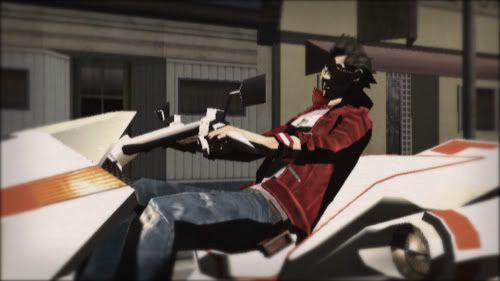 Also cool are the t-shirts you find in dumpsters around town and at Area 51, the game's clothing store. At first I thought adding an optional element of "play dress-up with Travis" was lame and pointless, but I have to admit I actually got into it, because the t-shirts you can wear are legitimately cool. And like Hiro, Travis gets around on a totally cool motorcycle. Travis' bike of choice is a massive flaming beast called a Schpeltiger.
Also cool are the t-shirts you find in dumpsters around town and at Area 51, the game's clothing store. At first I thought adding an optional element of "play dress-up with Travis" was lame and pointless, but I have to admit I actually got into it, because the t-shirts you can wear are legitimately cool. And like Hiro, Travis gets around on a totally cool motorcycle. Travis' bike of choice is a massive flaming beast called a Schpeltiger. And, perhaps most importantly, both Hiro and Travis know how to use a sword. Travis uses a lightsaber--err, beam katana--throughout the game (which is loaded with Star Wars references) while Hiro Protagonist's business card reads, among other things,
"Greatest swordfighter in the world."
With all these aspects of No More Heroes bouncing around in my head, reminding me of Snow Crash, I hoped that Travis Touchdown might turn out to be, like Hiro Protagonist (and contrary to the game's title), a true hero, someone smart and brave, fighting for something worth fighting for. A real cool guy. But as it turns out, despite his cool name and his cool t-shirts and his cool motorcycle and his cool way with a beam katana, Travis Touchdown is anything but cool. Dude is a straight-up loser if you ask me. His interests don't seem to encompass much besides anime and pro wrestling. He rents porn from Beef Head and humps his pillow. He can't handle himself around real women at all, and he has attitudes about sex that would seem immature coming from a 13-year-old.
So for a while I despised him. But at a certain point, I got it. Travis is, in a sense, the quintessential video game character, embodying all the loser attributes people frequently associate with "gamers." So many video game characters reek of what's come to be known as "baditude," a quality of being a badass to such a degree that it becomes almost parody. Travis Touchdown takes that concept to its logical conclusion. You just know that all these video game protagonists who act so tough are total losers when they're not busy saving the day. They're probably all obsessed with sex but utterly incapable of handling women as human beings. They probably all live alone in crummy apartments with no real social life to speak of. (Dante especially.) No More Heroes is just the first game honest enough to confront this fact.
The concept of games that know they're games is not an especially original one. EA's recent The Simpsons Game is a good example of a metagame, and it does a fine job of trotting out gaming cliches for our amusement. But No More Heroes, with its depiction of Travis as a helpless loser who thinks he's hot shit, cuts a bit deeper than your average metagame. It also makes a particular effort to recall the glory days of 8-bit video games. The menus have a great old-school sensibility to them, and when Travis nods off at one point, his dream even takes the form of an 8-bit-style game within the game.
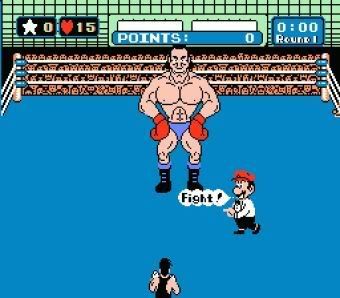 But this appreciation for old-school gaming goes beyond the menus and one-off dream sequence. The gameplay seems to me to be rooted in some of the best concepts of the 8-bit era. Although there are other things to do in No More Heroes, at its core this is a game that has you taking on a series of opponents, facing them one-on-one to rise through the ranks and prove yourself as the best assassin in the land. Most of all, I was reminded of the classic NES game Punch-Out!! (or Mike Tyson's Punch-Out!! if you prefer). That game had a very simplistic series of moves, and yet it was still very exciting and challenging. The challenge in Punch-Out!! came from playing defensively and using precise timing to take advantage of your opponents' vulnerabilities, and this same concept is at the heart of many of the confrontations in No More Heroes. The combat system isn't as complex as that in games like Devil May Cry or Ninja Gaiden, but the battles can nonetheless be very intense and satisfying. In fact, the overall simplicity of the game's combat system works to its advantage.
But this appreciation for old-school gaming goes beyond the menus and one-off dream sequence. The gameplay seems to me to be rooted in some of the best concepts of the 8-bit era. Although there are other things to do in No More Heroes, at its core this is a game that has you taking on a series of opponents, facing them one-on-one to rise through the ranks and prove yourself as the best assassin in the land. Most of all, I was reminded of the classic NES game Punch-Out!! (or Mike Tyson's Punch-Out!! if you prefer). That game had a very simplistic series of moves, and yet it was still very exciting and challenging. The challenge in Punch-Out!! came from playing defensively and using precise timing to take advantage of your opponents' vulnerabilities, and this same concept is at the heart of many of the confrontations in No More Heroes. The combat system isn't as complex as that in games like Devil May Cry or Ninja Gaiden, but the battles can nonetheless be very intense and satisfying. In fact, the overall simplicity of the game's combat system works to its advantage.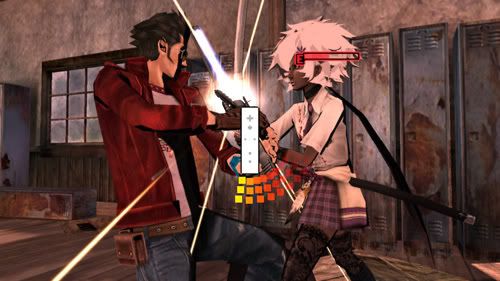 The Wii seems to be having a hard time establishing itself as a real gaming machine in the minds of many who have been playing games for a long time. Certainly No More Heroes would send many a housewife who purchased a Wii because she thought Wii Sports looked like fun running for the hills, and yet many "hardcore" gamers still seem to view the Wii as more of a gimmick than a console. Well, those people are wrong. The Wii is a real console, and outstanding games like Super Mario Galaxy and No More Heroes play to its strengths, incorporating motion controls to just the right degree, and providing experiences that are fresh and exciting and distinctly different from what else is out there.
The Wii seems to be having a hard time establishing itself as a real gaming machine in the minds of many who have been playing games for a long time. Certainly No More Heroes would send many a housewife who purchased a Wii because she thought Wii Sports looked like fun running for the hills, and yet many "hardcore" gamers still seem to view the Wii as more of a gimmick than a console. Well, those people are wrong. The Wii is a real console, and outstanding games like Super Mario Galaxy and No More Heroes play to its strengths, incorporating motion controls to just the right degree, and providing experiences that are fresh and exciting and distinctly different from what else is out there.As for Travis Touchdown, in the end, it turns out he's fighting for a bit more than is initially apparent. He may not be trying to save the world like Hiro Protagonist. He may not know how to handle himself around women like Hiro Protagonist. In fact, he may not be a hero at all. But he's still one of the freshest and most unusual video game protagonists to come along in a while, and No More Heroes is a bizarre, awesome and terrifically exciting game.






